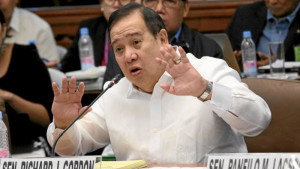President Duterte would place the entire country under martial law only when it is needed to “protect and preserve the safety of the people,” a Malacañang official said on Tuesday.
For the nth time, presidential spokesperson Ernesto Abella reiterated that the President would not arbitrarily impose military rule without any valid reason.
Speaking at a press briefing, Abella said the Chief Executive’s recent remarks that a sitting President should enjoy martial law authority without the approval of the Congress and the Supreme Court should be taken in “context.”
“The President was saying that… if martial law were to be taken for what it’s supposed to be, which is to… protect and preserve the safety of the people, then it should be facilitated,” Abella told reporters.
As to Vice President Leni Robredo’s statement branding Mr. Duterte’s statement as “appalling,” he said the country’s second highest elected leader merely “amplified her concerns.”
“And it (Robredo’s statement) seems to make it appear as if the President was actually planning of doing it,” he said, adding: “But if you read it in context, it was not (exactly what the President meant). It was not that way.”
In a speech in Pampanga last week, the President expressed his desire to amend the constitutional guarantees aimed at preventing an incumbent Chief Executive from abusing the power to declare martial law.
He described the judicial and legislative requirements set by the 1987 Constitution as “almost reckless reaction” of the Congress to the iron-fist rule of the late dictator Ferdinand Marcos, whose style of leadership he had openly praised.
“If I declare martial law and there is an invasion or war, I cannot proceed on and on, especially if there is trouble. I have to go to Congress, I have to go to the Supreme Court if anybody would file a complaint to look into the factual [basis of the declaration],” Mr. Duterte said.
“But what if the world is in chaos? That’s why there is martial law, so that only one person would be giving directions,” he added. “That’s why I want to change that. But there is a safety measure there. I’ll tell you later.”
According to Section 18 of the 1987 Constitution, the President may proclaim martial law and suspend the privilege of the writ of habeas corpus to repel rebellion or invasion when “public safety requires it” for a period of 60 days.
Within 48 hours after such declaration, the President is mandated to present a report to the Congress in person or in writing.
Voting jointly, the Senate and the House of Representatives may revoke the proclamation of martial law or the suspension of the privilege of the writ of habeas corpus by a vote of at least a majority of all its members, a process which the President cannot discard.


